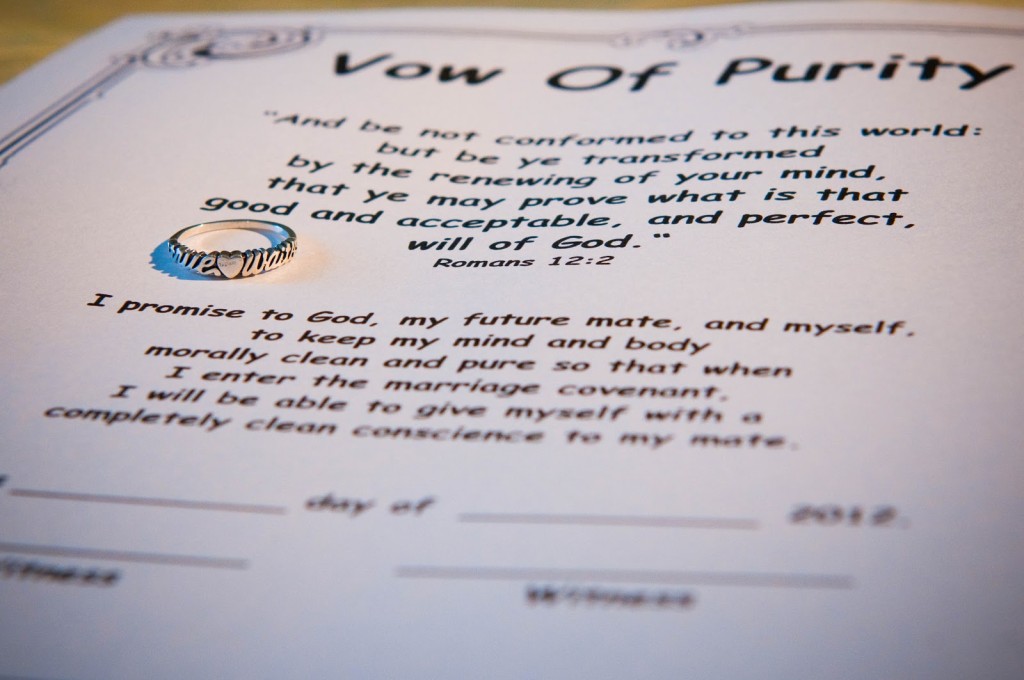


Social media has been ablaze this week with the story of a young woman who presented her father with a certificate of purity on her wedding day. Yes, you read that right: she presented her father with a certificate allegedly signed off on by a medical doctor that her hymen was intact, and they shared it on social media. This essay is not a condemnation of the presentation of that certificate. Rather, this is a conversation about sex and women that we wish we could have in church. Our conversation partner is Prof. Candice Benbow. Prof. Benbow is a first year doctoral student in Religion and Society at Princeton Theological Seminary. She is also a Lecturer in Women’s and Gender Studies at Rutgers University. In both ministry and the academy, she is interested in the question of freedom for Black women and the ways religion can hinder and facilitate freedom.
Churched Feminist: the sexuality of Black women in all of its expressions is often presented as problematic and is also demonized in the process…especially in some churches. I have heard many stories from women who got pregnant absent marriage and were brought before the church and shamed before the entire congregation WITHOUT the individual who impregnated them. Not to mention the stereotypes surrounding Black women’s sexuality in general…Sapphire, Jezebel…and as Melissa Harris-Perry rightly notes, the repackaging of these stereotypes as garden tools and gold diggers. It seems even in church, we don’t hear about our sexual selves in positive ways.
Prof. Benbow: You’re right; we don’t. Unfortunately, our bodies are demonized constantly. We believe Paul when he says, “In this flesh dwells no good thing” but reject God when God looks back on creation and calls it good. There’s so much happening (also in churches) to restrict Black women from seeing their bodies as gifts. Part of my work, and the work of others who identify as sex-positive Christian feminists and womanists, is to reconcile our whole selves. We’re not meant to be compartmentalized. We were created whole and meant to live whole. That pushes back on the ways the church has taught many of us to read the text and see ourselves. It requires a reprogramming of sorts that can hurt and can often be lonely but leads to a greater sense of self and who God is.
Churched Feminist: Biblical sexuality is often problematic as well. Many of the books of the Old Testament assume men will have multiple wives. But high value was placed on virginity, suggesting that women were permitted one husband. If you take these texts literally, a woman who was not a virgin on her wedding night should receive a death sentence (Deuteronomy 22:21)! Biblical marriage also lends itself to the notion that for women, sex is not something to be enjoyed so much as it is a means of adding to the population. In terms of sheer content, the Bible seems much more concerned with how we treat each other than what we do with our genitals. How do you think patriarchy plays a role in the way sex gets discussed?
Prof. Benbow: I think you just hit the nail on the head. We love to be biblical literalists when it suits us. We read certain texts and say, “well that’s the Word of God and we stand on the Word” not realizing—or even sometimes, ignoring—the very real ways Scripture can be harmful. None of us would be celebrating if she’d been killed on her wedding night, as scripture calls for us to do if she’s not a virgin. So, we have to check our motives in the celebration of this. We have to ask ourselves why are we wedded to such limiting and restrictive interpretations of Scripture to prove something? There’s amazing work being done by people like Valerie Bridgeman, Mitzi Smith, Kimberly Russaw and others who get inside these texts and show us how cultural obsession with female inferiority and submission lead to this insatiable appetite for Biblical/Christian patriarchy.What’s also been interesting is how people have used Scripture to justify this hymen examination, purity certificate and the public presentation of it all. Yet, if we’re going to lean on Scripture, doesn’t Jesus spend his entire ministry critiquing religious folk for their outward expressions of piety? Doesn’t he say many times that’s not what following him is about at all? What about Matthew 6:1? How do the words out Jesus’ own mouth contradict all of this?
Churched Feminist: One of my favorite graduate professors, Dr. Randall Bailey, reminded us often that the Bible can be used to liberate folks or oppress folks, it all depends on whose hands it is in. Let’s talk about the practice of abstinence until marriage. Although preserving one’s self for marriage is admirable, virginity and abstinence seem to receive the lion’s share of attention in the church when it comes to the sex conversation, particularly for women. But what about alternatives for those who do not fit into these categories? What do you do if the virgin until marriage train has passed you by? What about “born-again” virgins?
Prof. Benbow: I hear this from women all the time. And I ask them one question, “Are you a good person?” Do you genuinely endeavor to treat people with the loving-kindness of God? When I read the whole Bible, I come away knowing that God cares more about how I treat people than my sleep number. Seriously. Because you can be a virgin and be a mean girl at the same time. You can be abstaining from sex and not care at all about people who are suffering and in pain. And do you think God actually cares that you haven’t had sex yet when you’re mean to people you meet? It doesn’t work like that. So I work with sisters to say that there is so much more to life than being focused on whether or not you’ll be a virgin when you marry. And contrary to popular belief, being a virgin doesn’t mean you’ll marry first…or ever. There are plenty of 30+ year old virgins who are still single and desiring marriage. Abstinence is a beautiful thing. It is not and never will be the main thing…or the only thing.
Churched Feminist: According to statistics available at https://rainn.org/statistics, in any group of women more than four in number, there are likely to be survivors of domestic violence, sexual assault, incest and many other forms of abuse. Why do you think many churches are silent on a subject that impacts a much larger proportion of their congregations?
Prof. Benbow: Because many of our rapists and violators are in leadership. Seriously. A few years ago, the Black Women’s Blueprint did a study and found that, before the age of 18, close to 60% of Black girls would have been victims of sexual violence. 60%. Are we going to pretend that doesn’t include pastors, deacons, trustees and good tithing members as perpetrators? To discuss the sexual violence that’s happening in the pews would be to hold those in the pulpits and finance rooms accountable and rarely does that happen. Additionally, to discuss the violence that many women in church are experiencing would also mean we would have to confront the lies we tell ourselves about the kind of women who do and do not get violated. We grew up hearing that, when you place yourself in certain situations, you can expect certain outcomes. We gloried in this false dichotomy of the good girl and the bad girl. Yet, the good girls are the ones in the church who can’t say anything about what’s happened or happening to them because they don’t want to be seen as a bad one now. So, we don’t talk about it- not because we don’t know it’s happening, but because we’d have to hold ourselves accountable on too many fronts.
And for congregations looking for resources, “The Dinah Project: A Handbook for Congregational Response to Sexual Violence” by Monica A. Coleman and “A Womanist Pastoral Theology Against Intimate and Cultural Violence” by Stephanie M. Crumpton are timely and necessary.
Churched Feminist: Thank you for sharing these resources, I would recommend them as well! What would you say has been the most interesting part of this for you, the fact that a father and daughter decided to document her virginity publicly?
Prof. Benbow: What I’ve found to be interesting are the ways, in this case, people are conflating the fact that this bride was a virgin with her having a medical exam to prove her hymen was intact. And when you call people on this, they’ll say things like “I’m not saying she had to take it that far but we need to celebrate people who choose to wait.” No. The issue is that she took it that far. And not only did she take it that far, she made it public information. What is scary about all of this conversation is how, whenever someone invokes God when it comes to matters of sex and sexuality, some of the most critically thinking people sound ridiculous. There is nothing wrong with a woman choosing to share her first sexual experience with her husband. It’s beautiful actually. What is wrong, however, is a woman having an exam to verify her purity for her father and making that information public. People are critiquing that. And the reason others are conflating the two issues because they know that nothing about that act, itself, was right.
Churched Feminist: Candice, thank you so much for sharing your profound insights with us.
Prof. Benbow: my pleasure!